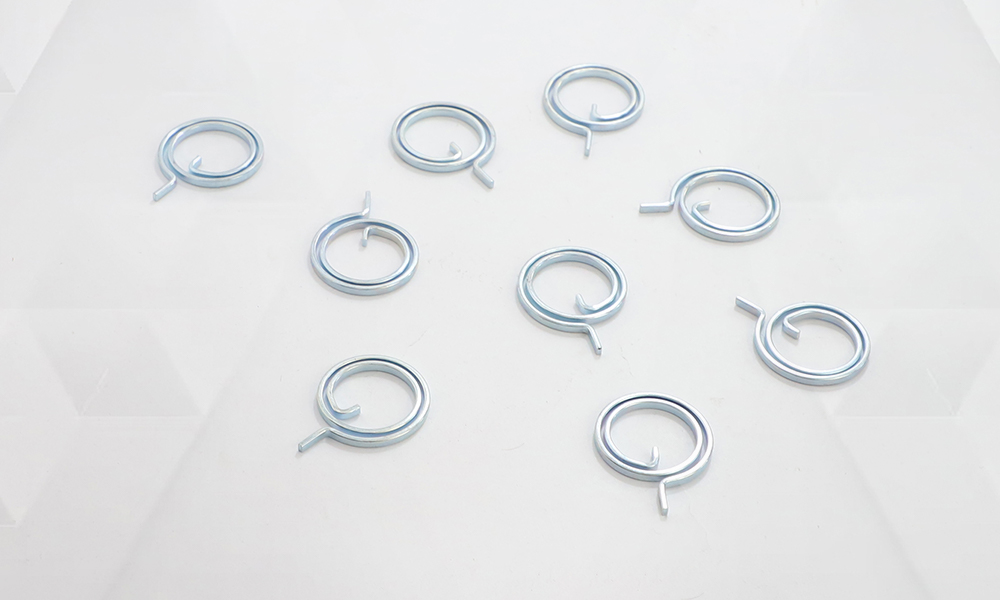




In the universe of precision engineering and mechanical motion, Spiral Springs—commonly referred to as constant force springs or clock springs—are an unseen but potent force. Developed to provide steady torque in a compact package, these springs are vital elements in numerous mechanical systems throughout a wide range of industries.
So how does a spiral spring achieve such effectiveness and reliability? Let's take a look at the inner mechanics, materials, finishes, and applications of this coiled giant.
What are Spiral Springs? 🌀
Spiral springs are closely wound, flat metal strips curved into a spiral or coil. In contrast to helical compression springs, spiral springs are used to function in rotational motion. When force is applied to rewind or unwind the spring, it provides torque, generally within a 360° rotation span. Their compactness and accuracy make them perfectly suited to uses where controlled motion and consistent force are important.
Every spiral spring consists of:
🔹 An inner end attached to a center arbor or shaft
🔹 An outer end attached to the rotating device requiring torque
The construction keeps the coils from ever contacting each other while in use, avoiding wear and ensuring long life.
Materials That Matter ⚙️
Material selection is important for optimal performance:
Spring Steel 💪
Extremely durable and elastic, spring steel provides great fatigue resistance—ideal for recurring load cycles without deformation.
Stainless Steel 🌧️
Corrosion-resistant and perfect for humid or chemically harsh conditions, stainless steel provides maintenance-free performance with guaranteed dependability.
Surface Finishes: There's More Than Meets the Eye ✨
To protect the life and performance of spiral springs, many different surface finishes are applied:
🔹 Zinc Plating – Creates a rust-resistant coating
🔹 Galvanizing – Adds increased resistance to corrosion for use outdoors
🔹 Powder Coating – Provides both visual beauty and increased durability
🔹 Black Oxide – A matte black appearance with a moderate degree of corrosion protection
🔹 Passivation – Enhances the natural oxide film of stainless steel, providing resistance to tarnish and rust
Each finish is selected based on the working conditions and performance requirements of the spring.
Precision Manufacturing 🛠️
Spiral springs are produced on CNC spring forming machines or special-purpose SPMs to provide accuracy in every turn. The machines support:
🔧 High repeatability
🔧 Tight tolerances
🔧 Tailored coil geometry
🔧 Controlled force output
This level of manufacturing accuracy is crucial for applications where even the slightest deviation could affect performance.
Applications: Where You’ll Find Them 🚗🪟🛍️🩺
Despite their simple appearance, spiral springs are at work in a wide range of everyday and industrial applications, such as:
✔ Seat Belts – Retraction mechanisms rely on smooth torque
✔ Car Windows & Door Handles – For automatic return action
✔ Point-of-Purchase Displays – For reliable product positioning
✔ Counterbalancing Systems – Such as vertical blinds and retractable cords
✔ Medical Devices & Tools – Where precision and reliability are essential
Wherever controlled rotation or return force is required, a spiral spring is probably working quietly in the background.
📞 Contact Us
For questions, needs for quote, or for a mass order, please contact us via;
📧 Email: crystalspringindia@gmail.com
☎ Phone: +91 94262 34547
🌐 Website: www.crystalspringindia.com
📍 Address: GIDC Phase – 3,Dared, Jamnagar – 361004,Gujarat, India